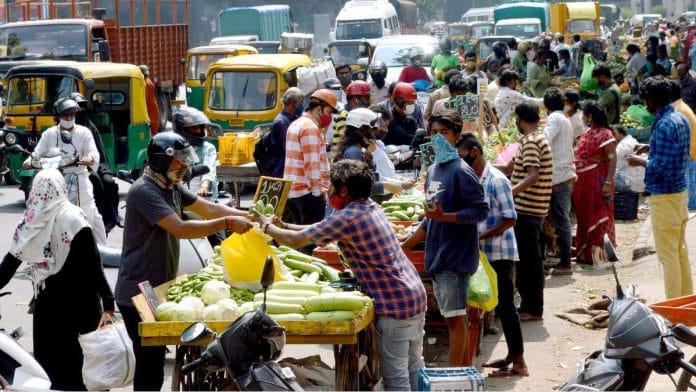Bengaluru: Bengaluru is going micro to tackle Covid-19, which has hit the city and Karnataka hard during the second Covid-19 wave. The state government has instructed the Bengaluru civic agency — the Bruhat Bengaluru Mahanagara Palike (BBMP) — to set up committees in each of the city’s 198 wards to better manage the pandemic.
The order, issued 8 May, states that the panels will be called Ward Decentralised Triage and Emergency Response (Ward DETER) committees. Among other things, the committees will ensure critical Covid patients receive immediate medical attention, and that a constantly-updated list of hospital beds and oxygen resources is maintained. They are being counted on to strengthen the city’s hand before the predicted third wave sweeps in.
Explaining the need for ward-level committees, the government cited “inefficient mechanisms” and said a delay of 12 hours was seen between identification of a Covid-19 patient and their admission to hospital.
War rooms, it added, were getting helpless as the demand for beds and oxygen support was increasing multiple-fold.
Karnataka minister Arvind Limbavali, in charge of the Covid war room call centre management, said the committees will monitor each of the wards at the micro-level, and the status of oxygen and beds will be updated every two hours.
“This will help us effectively manage beds and decentralising it will help us get real-time updates at the micro-level,” he told ThePrint.
As on 8 May, Bengaluru had a total of 3,44,754 active cases, with the city recording 7,776 deaths so far. In the last 7 days, Bengaluru has recorded 1,32,704 cases.
Also read: Moons with masks, sky on Skype — Covid has changed life for Bengaluru astronomers’ club
Colour-coding
The system of decentralising Covid response to the ward level has also been followed in Mumbai.
Speaking to ThePrint, BBMP officials said Covid patients in a ward will be colour-coded — red, yellow and orange — based on their health status to ensure admission of critical patients first. Admission will be prioritised for those coded red, followed by those in the yellow and orange categories.
They will also list the Covid patients who can be treated with home isolation.
“If a patient is admitted with severe Covid-19 complications, they will be given priority. A patient who seems to be responding to medication and is not in need of any critical care like ICU or oxygen, they should be either shifted to Covid care centres or sent into home isolation. If they fail to do so, the hospital will have to give an explanation,” Limbavali said, quoting from the order.
‘Will map best possible care’
According to the order, the 198 committees will be headed by a nodal officer who will be designated as the chairperson of each panel.
The chairperson will be assisted by government officials, Resident Welfare Association members, volunteers and Covid frontline warriors trained to handle the pandemic.
‘Triage coordinators’ will play one of the most important roles. Medical professionals and volunteers in the health sector will help the coordinator conduct contact-tracing, testing, and hospitalisation at the ward level.
Asavari Patil, a volunteer who will be part of a ward committee, said they “have been briefed to visit homes and check on people”.
“If we are informed of a positive case, we will help them organise their shift to the testing clinic, hospital and later to a Covid care centre (CCC). We have several CCCs across the city that are well equipped,” Patil added. “We will connect with other wards to map the best possible care for the patient.”
A BBMP officer of the Horamavu ward said this “will reduce the time spent and with a well-oiled system, the stress of Covid management will also reduce as we will be able to reach out faster and give people treatment quickly”.
“We will also assist in vaccination drives,” the officer added.
Also read: Lack of oxygen blamed as 24 patients, including 12 with Covid, die at Karnataka govt hospital






